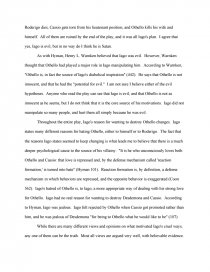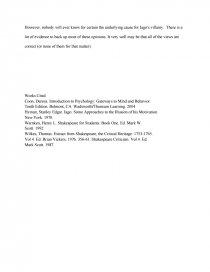Iago's Motivations
Essay by review • December 10, 2010 • Research Paper • 979 Words (4 Pages) • 1,288 Views
Every good play has a great villain. Othello by William Shakespeare is no exception. In writing Othello, Shakespeare took characters he had gotten from an Italian short story, and developed them further. I would not say Shakespeare created Iago, but he definitely made Iago the evil man that everyone knows him to be. Iago may be one of the greatest villains of all time. He was honest, loyal, and brave in all of the other characters' eyes. However, in reality he was a cruel, deceitful, immoral man. As with every great villain, Iago had to have been motivated by something. Although it is debatable, I believe the main motivation behind his villainy is his repressed homosexuality, and his attraction to Othello.
There are many different views on what motivated Iago to set out to destroy so many innocent people. Many critics argue the not being promoted is his only motivation. Clearly, Iago's ego was shattered when he was not promoted, however, it seems to be just another excuse for hating Othello. Thomas Wilkes believes that Iago's motivation for wanting to destroy Othello was based only on him not being promoted to lieutenant. He says that Iago had "no other real motive for his villainy." Wilkes recognized that Iago stated other possible motives, but argues that he only used them to deceive Roderigo. Wilkes' opinion is a very popular one, but I believe that the real motivation is more complex than his not being promoted. If that was the only reason, why did he not stop scheming after Othello made him lieutenant?
Stanley Edgar Hyman believed that Iago was just plain evil. Actually, that he was, in fact, Satan. He says that
Iago is motivated by the fact that he is Satan or a figuration of Satan, eternally fixed in posture of hatred of God and envy of man. He wins the souls of men by promising to gratify their desires: Roderigo's for Desdemona, Cassio's for his return to favor, Othello's for certainty (perhaps the certainty of guilt). (Hyman 29)
Iago manipulates these people so easily. He actually does, in some way, take their souls. Roderigo dies, Cassio gets torn from his lieutenant position, and Othello kills his wife and himself. All of them are ruined by the end of the play, and it was all Iago's plan. I agree that yes, Iago is evil, but in no way do I think he is Satan.
As with Hyman, Henry L. Warnken believed that Iago was evil. However, Warnken thought that Othello had played a major role in Iago manipulating him. According to Warnken, "Othello is, in fact the source of Iago's diabolical inspiration" (442). He says that Othello is not innocent, and that he had the "potential for evil." I am not sure I believe either of the evil hypotheses. Anyone who read the play can see that Iago is evil, and that Othello is not as innocent as he seems, but I do not think that it is the core source of his motivations. Iago did not manipulate so many people, and hurt them all simply because he was evil.
Throughout the entire play, Iago's reason for wanting to destroy Othello changes. Iago states many different reasons for hating Othello, either to himself or to Roderigo. The fact that the reasons Iago states seemed to keep changing is what leads me to believe that there is a much deeper psychological
...
...


